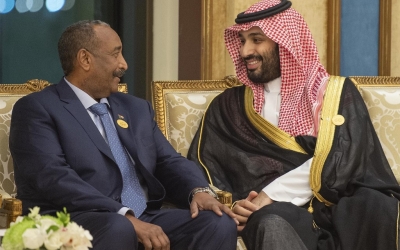Sudan: Security forces detain opposition leaders after meeting with Ethiopia PM

Sudanese security forces have detained at least two prominent rebel figures and an opposition leader since Friday, after the men met with the Ethiopian prime minister.
Ethiopia's Abiy Ahmed was attempting to mediate between Sudanese opposition and military leaders, days after a bloody assault on protesters in the capital Khartoum left scores dead.
Abiy flew to Khartoum on Friday and held separate talks with members of Sudan's Transitional Military Council (TMC) and the opposition Alliance for Freedom and Change.
But opposition politician Mohamed Esmat, Sudan People's Liberation Movement-North (SPLM-N) leader Ismail Jalab and SPLM-N spokesman Mubarak Ardol were detained in the wake of the meeting, aides told AFP on Saturday.
Esmat was reportedly arrested shortly after the meeting on Friday, while Jalab and Ardol were detained early on Saturday.
New MEE newsletter: Jerusalem Dispatch
Sign up to get the latest insights and analysis on Israel-Palestine, alongside Turkey Unpacked and other MEE newsletters
"A group of armed men came in vehicles at 3:00 am (1:00 GMT) and took away Ismail Jalab .. without giving any reason," Jalab aide Rashid Anwar told AFP.
"We don't know where they are being held," he added.
Esmat and Jalab are both leading members of the Alliance for Freedom and Change, which brings together opposition parties and rebel groups with the organisers of the mass protests which have gripped Sudan since December last year.
The arrests come just days after the SPLM-N's deputy leader, Yasir Arman, was seized from his home in Khartoum.
Abiy had called for a "quick" democratic transition in Sudan, where a deadly military assault on opposition protesters left more than 100 people dead and injured many more earlier this week.
"The army, the people and political forces have to act with courage and responsibility by taking quick steps towards a democratic and consensual transitional period," Abiy said in a statement reported by AFP.
An adviser to the Ethiopian leader told Reuters news agency on Friday that the talks went well.
While there was no information about a possible breakthrough in talks or further details about what was discussed, the arrests have cast further doubt on the TMC's willingness to cede power.
Abiy's effort to mediate between the two sides came after the Sudanese military carried out a deadly assault on protesters at a sit-in across from the army headquarters in Khartoum.
Eyewitnesses said bodies were thrown into the Nile River, while medics continued to struggle to treat scores of wounded protesters.
On Friday, AFP reported that Sudanese protest leaders welcomed Abiy's mediation, but insisted any fresh talks with the generals could happen only if certain conditions were met.
"The Transitional Military Council has to admit to the crime it committed," Omar al-Digeir, a prominent leader from the protest movement, the Alliance for Freedom and Change, told reporters.
He said that all "military elements should also be removed from the streets across the country" and also called for an international probe into "the massacre at the sit-in", AFP reported.
List of demands
On Thursday, the opposition Sudanese Professionals' Association (SPA) rejected a call to negotiate with the TMC following the deadly crackdown.
The TMC took over after a military coup in April deposed longtime President Omar al-Bashir after months of opposition protests against his nearly three-decade rule.
Sudanese protesters have repeatedly called for the military council to hand control of the country over to a civilian-led government.
The African Union also suspended Sudan on Thursday until the military makes way for a civilian-led transitional authority.
That same day, the SPA, which has spearheaded months of protests across Sudan, listed a string of demands, which it said would have to be met before it re-entered into talks with the army.
The demands include the transfer of Sudan's government to civilian rule, the dissolution of the Janjaweed militia and the handover of Janjaweed fighters' weapons to the military.
The Janjaweed is related to the Rapid Support Forces (RSF), members of which have been accused of carrying out this week's deadly crackdown on the Khartoum sit-in.
Middle East Eye delivers independent and unrivalled coverage and analysis of the Middle East, North Africa and beyond. To learn more about republishing this content and the associated fees, please fill out this form. More about MEE can be found here.





